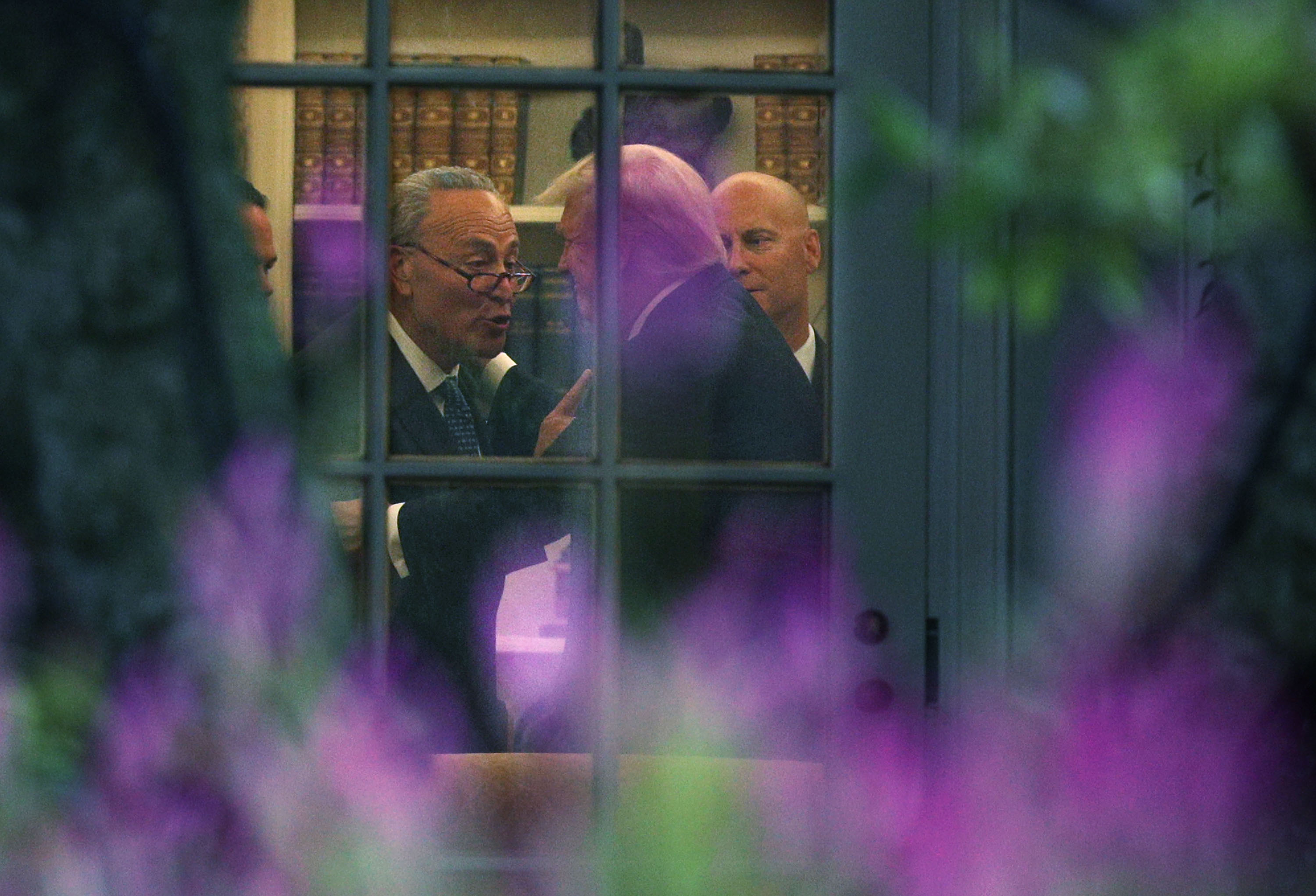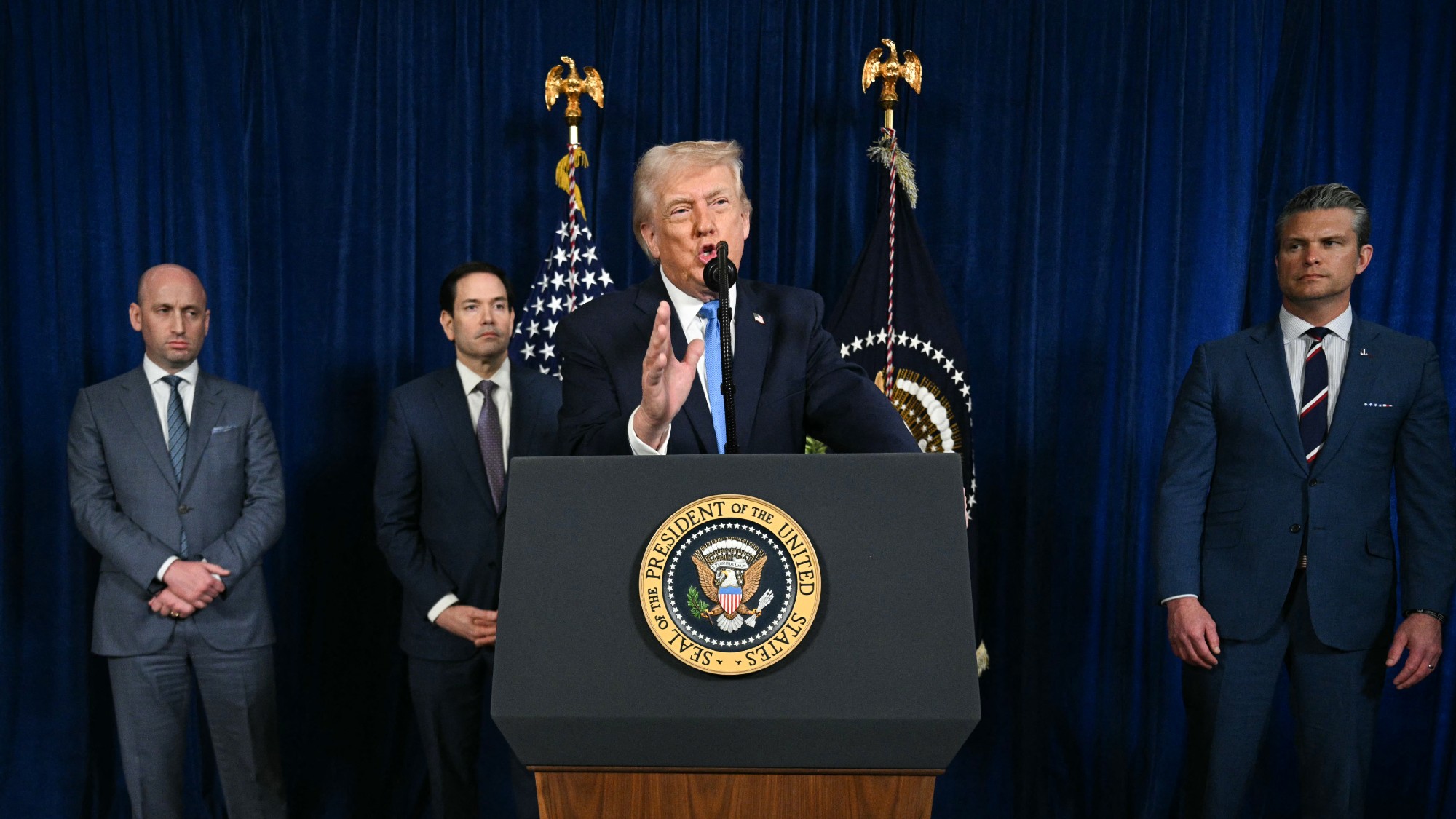Trump made his very first halfway smart political move. Too bad it's too late.
Folks, the president is stupid


The federal debt limit, an archaic holdover from a century ago, needs to be raised again soon. Remarkably, President Trump has reached an agreement with congressional Democrats not just to raise it, but to look into abolishing it altogether — drawing the fury of the congressional Republican leadership.
What is perhaps most surprising is that it took this long for Trump to try this tactic — and long past when it would have possibly worked. Folks — and by the way, everyone is saying this, you'd be surprised — the president is stupid.
When Trump was first elected, he faced extraordinarily unfavorable political terrain. He was the least popular person ever elected to the presidency since the advent of modern polling (and very likely in American history), who had lost the popular vote, and whose party was even less popular than him. Even worse, the historical agenda of the party — vicious cuts to social insurance coupled to gigantic tax cuts for the rich and deregulation — was less popular still. Nobody wants to give up their insurance so Steve Schwarzman can have another billion dollars. Governing with such a coalition was always going to be hazardous.
The Week
Escape your echo chamber. Get the facts behind the news, plus analysis from multiple perspectives.

Sign up for The Week's Free Newsletters
From our morning news briefing to a weekly Good News Newsletter, get the best of The Week delivered directly to your inbox.
From our morning news briefing to a weekly Good News Newsletter, get the best of The Week delivered directly to your inbox.
That should have been even more obvious to Trump given the way that he won both of his elections. He dominated the Republican primary while promising to protect Social Security, Medicare, and Medicaid, scoffing at the deficit, and promising big infrastructure spending. He won the general election along the same lines, with vague but effective lines about bringing back manufacturing jobs and rebuilding the country — coupled, of course, to hateful anti-immigrant and anti-Muslim fulmination.
Given these facts, Trump's best strategy for gaining some popular backing, splitting his opponents, and preparing for re-election would have been to downplay the racist rhetoric and attempt to negotiate with Democrats to pass some big-ticket economic populism. Sideline the despised congressional leadership of his own party and push a big infrastructure package, a renegotiation of various trade deals, some pro-union rules, and perhaps a big new expansion of welfare. Coming out in favor of, say, putting everyone under 26 on Medicare would drive a wedge between the anti-Trump diehards, and the Medicare-for-all diehards. If he couldn't get it passed, he could then at least portray himself as fighting for popular policy against a hapless Congress — the most despised political institution of all.
The problem, as was quickly apparent, is that Trump is so ignorant that he has only the faintest idea of how federal policy works or even what the various programs are. He staffed his administration with hard-right ideologues like Mick Mulvaney, his director of the Office of Management and Budget, who quickly churned out typical Republican fare. His budget was an eyewatering — and almost contemptuously innumerate — upward redistribution of wealth. Mulvaney proceeded to boast repeatedly to reporters that he was easily able to trick Trump into accepting savage cuts. For example, he got Trump to break his promise on Social Security by simply leaving out the first two words of the Social Security Disability Insurance program. Easy peasy!
When it comes to the federal debt ceiling, Trump's ignorance just might have helped him. The debt ceiling is a relic of a previous age, when instead of having to authorize every new instance of borrowing, Congress decided to just authorize a whole bunch of new borrowing and save time. This became a piece of legislative cruft that had to be nudged up every now and then, an opportunity for some grandstanding for the party that was out of power but nothing that important.
A free daily email with the biggest news stories of the day – and the best features from TheWeek.com
However, during the Obama presidency, extremist right-wing Republicans hit on the idea of holding the debt ceiling hostage to obtain policy concessions. American debt is the foundation of the global financial system, and deliberately defaulting would very likely cause an instant economic cataclysm. They got into repeated high-stakes confrontations with Obama over this, who held off after idiotically attempting to negotiate the first time.
But fundamentally, having a debt ceiling is completely senseless. In every other country, you hash out debt issues during the budget process. Once you figure out spending and revenue, you just automatically authorize whatever borrowing is needed to fill the gap. Having a separate arbitrary debt limit that you bump into semi-randomly is just pointless.
I imagine Trump was very confused when someone patiently explained to him the debt ceiling problem. And in this case, the naive reaction from someone totally unversed in policy arcana — why do we even have that? — is the exact right one. Thus, the agreement with Chuck Schumer and Nancy Pelosi to get rid of it altogether.
Unfortunately for Trump's political standing, his attempts to pass vicious social insurance cuts and his expressions of sympathy for neo-Nazis and white supremacists have made him utterly radioactive among Democrats. Even if he were to somehow take a crash course in Government 101 and start pushing for genuine economic populism, he'd likely find few takers in the party.
In order to make good deals, you need to be smart enough to understand what is being bargained over.
Ryan Cooper is a national correspondent at TheWeek.com. His work has appeared in the Washington Monthly, The New Republic, and the Washington Post.
-
 The best art exhibitions to book in 2026
The best art exhibitions to book in 2026The Week Recommends Our pick of the shows to see across the UK, from epoch-defining embroidery to fresh looks at under-appreciated artists
-
 What is the Donroe Doctrine?
What is the Donroe Doctrine?The Explainer Donald Trump has taken a 19th century US foreign policy and turbocharged it
-
 Could a part-and-part mortgage help you on to the property ladder?
Could a part-and-part mortgage help you on to the property ladder?Combining repayment and interest-only mortgages could become more popular as part of a push towards more flexible lending
-
 Bari Weiss’ ‘60 Minutes’ scandal is about more than one report
Bari Weiss’ ‘60 Minutes’ scandal is about more than one reportIN THE SPOTLIGHT By blocking an approved segment on a controversial prison holding US deportees in El Salvador, the editor-in-chief of CBS News has become the main story
-
 Has Zohran Mamdani shown the Democrats how to win again?
Has Zohran Mamdani shown the Democrats how to win again?Today’s Big Question New York City mayoral election touted as victory for left-wing populists but moderate centrist wins elsewhere present more complex path for Democratic Party
-
 Millions turn out for anti-Trump ‘No Kings’ rallies
Millions turn out for anti-Trump ‘No Kings’ ralliesSpeed Read An estimated 7 million people participated, 2 million more than at the first ‘No Kings’ protest in June
-
 Ghislaine Maxwell: angling for a Trump pardon
Ghislaine Maxwell: angling for a Trump pardonTalking Point Convicted sex trafficker's testimony could shed new light on president's links to Jeffrey Epstein
-
 The last words and final moments of 40 presidents
The last words and final moments of 40 presidentsThe Explainer Some are eloquent quotes worthy of the holders of the highest office in the nation, and others... aren't
-
 The JFK files: the truth at last?
The JFK files: the truth at last?In The Spotlight More than 64,000 previously classified documents relating the 1963 assassination of John F. Kennedy have been released by the Trump administration
-
 'Seriously, not literally': how should the world take Donald Trump?
'Seriously, not literally': how should the world take Donald Trump?Today's big question White House rhetoric and reality look likely to become increasingly blurred
-
 Will Trump's 'madman' strategy pay off?
Will Trump's 'madman' strategy pay off?Today's Big Question Incoming US president likes to seem unpredictable but, this time round, world leaders could be wise to his playbook
